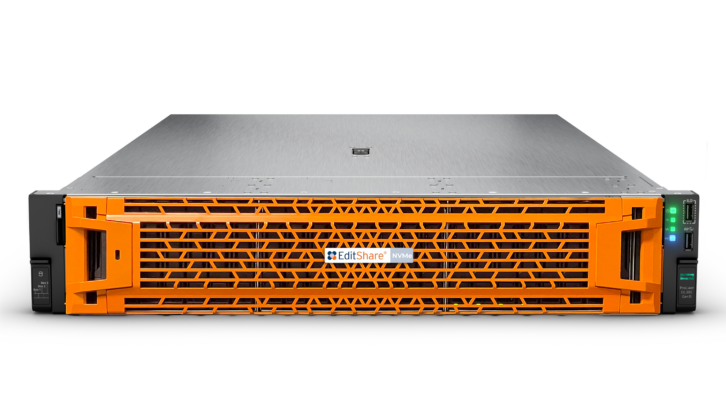The result of what the company describes as a “relentless pursuit of speed and efficiency”, the EFS NVMe is a groundbreaking new storage platform developed by networked shared storage and smart workflow solutions company EditShare.
The latest addition to the EditShare EFS storage and asset management platform, NVMe (non-volatile memory express) is a storage node created to provide remarkable levels of performance, power, efficiency and throughput. It is especially suitable for applications where multiple users are placing significant demands on storage systems with content in demand by multiple users.
At the heart of NVMe is an open, logical device interface specification which provides a connection for flash memory, usually in the form of solid state drives (SSDs), whose low latency makes them ideal for media applications. NVMe also adds the ability to address the SSD content in parallel, whilst internally the storage is arranged for parallel access in an architecture that further reduces latency and provides considerable bandwidth.
Ever-increasing amounts of content
The logic for NVMe – which is a published and widely recognised specification – is stored and executed by the controller chip within the storage node, meaning it can be transparently attached to wider networks providing they can accommodate the very fast throughput. In the case of EFS NVMe, the node is built on the latest Gen11 server platform from HPE, with bays for 24 SSD drives in 2RU. Multiple NVMe nodes can be incorporated with disk-based storage in a single network to provide the performance required.
Other key aspects of the technical specification include EFS Client drivers for Mac, Windows and Linux platforms; EFS project sharing and guardian auditing (option); and dual NVMe OS drives (HW RAID1). Each node supports dual 100Gb/s connections with a highly tuned hardware and software stack, ensuring the highest throughput from a COTS platform.

The end result is a storage solution that makes it possible to seamlessly edit, render and process high-resolution 4K or 8K media files with formidable speed, allowing creative workflows to remain uninterrupted and deadlines to be met with ease.
As a result, it is expected that EFS NVMe will resonate with production and post facilities around the world, many of whom already depend upon the EFS platform to store and manage media. The success of EFS owes much to its flexibility and ready scalability, its ability to seamlessly manage content across multiple locations on-premise and in the cloud, and its capacity for speed and efficiency. Alongside the storage architecture, EditShare’s FLOW asset and workflow management software provides rich, intuitive and productive management at user, project and enterprise levels.
Anyone involved in production or post will know that the amount of content being handled is continuing to grow, with increased camera count, higher resolutions and high-quality visual FX – involving the extensive use of file-per-frame formats such as DPX and OpenEXR – among the developments placing considerable bandwidth requirements on storage systems. Simultaneously, there is also an expectation that projects will be completed to ever-tighter deadlines in order for content services to get more programmes on air and drive revenue growth.
Inevitably, this places major demands on storage systems, particularly when content is in demand by multiple users. Reality television and sports are prime examples here, with the same content needed to tell many different versions of the story. In applications like these, EFS NVMe can be transformative as it provides extremely fast read and write access to multi-layer, multi-user media projects, all while maintaining ultra-low latency and an avoidance of bottlenecks.
Integration and sustainability
The EFS file system also provides integration and content flow between the storage network and the leading editorial, grading and finishing software suites. In addition, the EFS software stack includes advanced bandwidth control features which can be used to reserve bandwidth capacity for individual workstations, users or projects, ensuring that client applications needing the maximum throughput are served in priority, while other applications will be serviced with the remaining available bandwidth.
It’s also important to highlight the fact that EFS NVMe is highly complementary to production and post companies’ drive towards greater sustainability. It is very power efficient and therefore reduces the need for air-conditioning, resulting in a valuable reduction to the customer’s carbon footprint.
To find out more about EFS NVMe and other EditShare solutions for content production and post-production, please visit editshare.com







